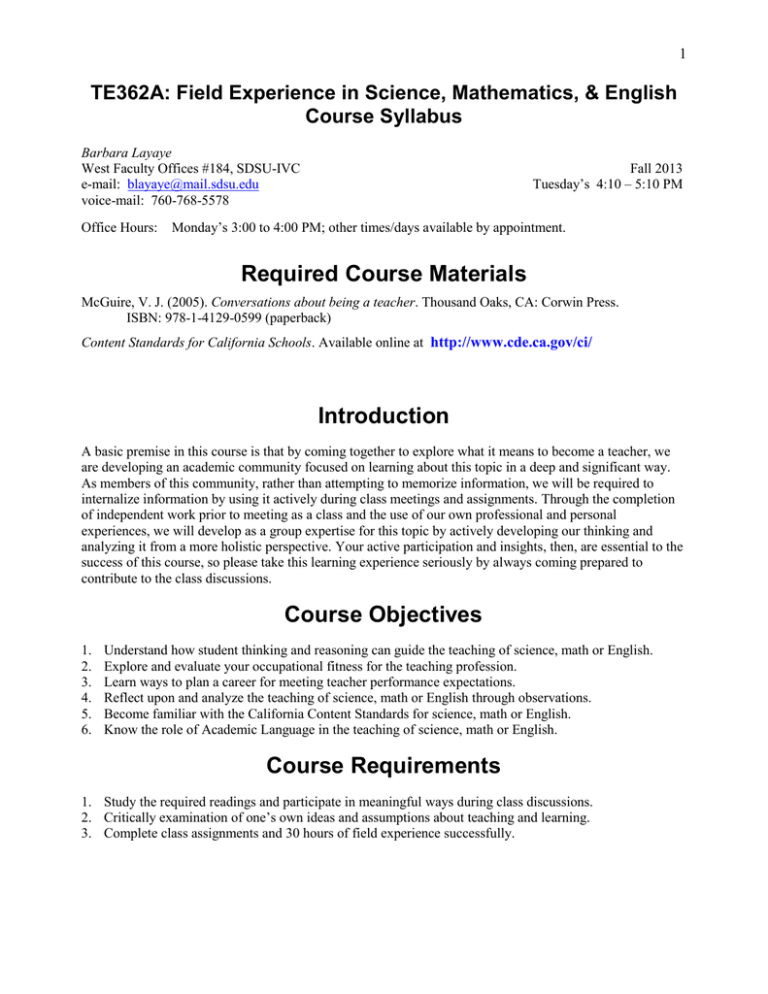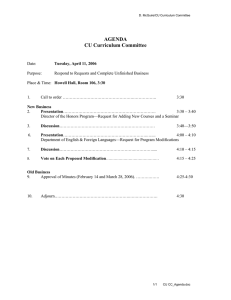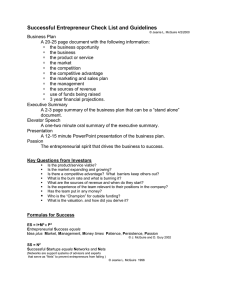TE362A: Field Experience in Science, Mathematics, & English Course Syllabus 1
advertisement

1 TE362A: Field Experience in Science, Mathematics, & English Course Syllabus Barbara Layaye West Faculty Offices #184, SDSU-IVC e-mail: blayaye@mail.sdsu.edu voice-mail: 760-768-5578 Office Hours: Fall 2013 Tuesday’s 4:10 – 5:10 PM Monday’s 3:00 to 4:00 PM; other times/days available by appointment. Required Course Materials McGuire, V. J. (2005). Conversations about being a teacher. Thousand Oaks, CA: Corwin Press. ISBN: 978-1-4129-0599 (paperback) Content Standards for California Schools. Available online at http://www.cde.ca.gov/ci/ Introduction A basic premise in this course is that by coming together to explore what it means to become a teacher, we are developing an academic community focused on learning about this topic in a deep and significant way. As members of this community, rather than attempting to memorize information, we will be required to internalize information by using it actively during class meetings and assignments. Through the completion of independent work prior to meeting as a class and the use of our own professional and personal experiences, we will develop as a group expertise for this topic by actively developing our thinking and analyzing it from a more holistic perspective. Your active participation and insights, then, are essential to the success of this course, so please take this learning experience seriously by always coming prepared to contribute to the class discussions. Course Objectives 1. 2. 3. 4. 5. 6. Understand how student thinking and reasoning can guide the teaching of science, math or English. Explore and evaluate your occupational fitness for the teaching profession. Learn ways to plan a career for meeting teacher performance expectations. Reflect upon and analyze the teaching of science, math or English through observations. Become familiar with the California Content Standards for science, math or English. Know the role of Academic Language in the teaching of science, math or English. Course Requirements 1. Study the required readings and participate in meaningful ways during class discussions. 2. Critically examination of one’s own ideas and assumptions about teaching and learning. 3. Complete class assignments and 30 hours of field experience successfully. 2 Evaluation Your final grade will depend on how well you complete the course requirements and how well you show that you have met the course objectives. Clarity of thought and expression, both in writing and in speaking, are very important for your success in this course. Using higher order thinking skills is the key to your earning a high grade in this course. In order for all of us to maximize the opportunities we will have to understand better the process of being a teacher, we will always need to present ourselves, and our ideas, in a professional manner. Specifically, The work (content, presentation, timeliness) we prepare must be of the highest quality. Keep in mind that I may ask you to redo assignments to meet this requirement. Attendance is not optional and arriving on time, prepared to work together, is essential for the success of our academic community. Your grade will be reduced by 15% each time that you are absent or an excessive number of tardies. Plagiarism will result in automatic referral of the student to Student Affairs for action. I do not accept late work, so please make sure to submit your work by their due dates. Grading Standards A, A-: Outstanding Achievement B+, B, B-: Demonstrable Achievement C+, C, C-: Partial Achievement 100%-90% 89%-80% 79%-70% D+, D, D-: Minimal Achievement F: Lacking Achievement Course Outline 8/27 Day One – Introduction to Course Areas of Focus: Mission and Vision about Teaching and Learning Getting to know one another Syllabus overview McGuire: Foreword, Conversation One. 9/3 Day Two – Introduction to Field Experience Areas of Focus: Expectations and Caring McGuire: Conversations Two and Three Field Experience Guidelines 9/10 Day Three – NO CLASS MEETING Areas of Focus: Field Experience 9/17 Day Four – Common Core Academic Content Standards Areas of Focus: Commitment McGuire: Conversation Four Article/Video Analysis Assignment Criteria 69%-60% 59%-00% 3 9/24 Day Five – NO CLASS MEETING Areas of Focus: Field Experience 10/1 Day Six – Interview 1: Classroom Management Areas of Focus: Respect McGuire: Conversation Five Article/Video Analysis Due 10/8 Day Seven – NO CLASS MEETING Areas of Focus: Field Experience 10/15 Day Eight – Interview 2: Curriculum and Instruction Areas of Focus: Observation McGuire: Conversation Six Interview 1 Due 10/22 Day Nine – NO CLASS MEETING Areas of Focus: Field Experience 10/29 Day Ten –Teacher Performance Expectations; Academic Language Areas of Focus: Cultural Awareness McGuire: Conversation Seven Interview 2 Due 11/5 Day Eleven – NO CLASS MEETING Areas of Focus: Field Experience 11/12 Day Twelve –Interview 3 Understanding Student Thinking & AL Areas of Focus: Balance McGuire: Conversation Eight 11/19 Day Thirteen – NO CLASS MEETING Areas of Focus: Field Experience 11/26 Day Fourteen – Making Content Accessible Areas of Focus: Teambuilding McGuire: Conversation Nine Interview 3 Due 12/3 Day Fifteen – NO CLASS MEETING Areas of Focus: Field Experience 4 12/10 Day Sixteen – Observation/Activity Forms and Reflections Areas of Focus: Growth and Knowledge McGuire: Conversation Ten 12/17 Final Exam Course Description Directed Field Experience with a 30 hour placement to help Science, Mathematics & English undergraduate majors learn about instructional practices and methodologies in a classroom setting. Course Assignments 1. Field Experience (60 points) Your major assignment for this course is to complete at least 30 hours of field experience in a grade 7-12 classroom. There are three required components of this assignment 30 hours Observation Log, verified by host teacher (20 points) Field Experience - Activity List (20 points) Field Experience Reflection Journal (20 points) 2. Interviews (30 points) You will conduct three interviews from your 30 hour observation classroom. Specific interview and evaluation criteria will be discussed in class. Each interview assignment is 10 points for a total of 30 points. 3. Video/Article Analysis (10 points) You will analyze a video/article related to teaching and student learning. Specific directions and evaluation criteria will be discussed in class.

